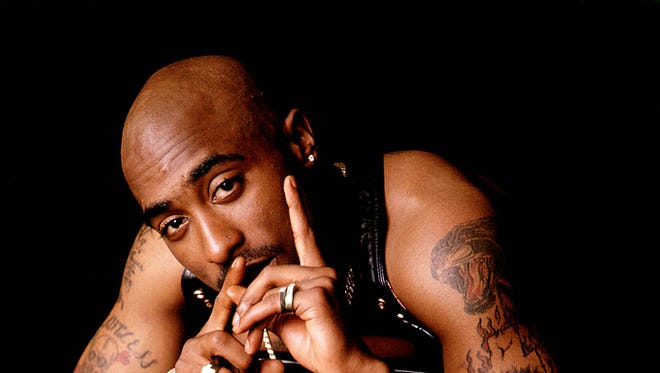In the quarter-century since his death, Tupac Shakur’s fame has flourished.
He would have appreciated that, filmmaker Allen Hughes said. “He was a myth-builder.”
Now Hughes’ documentary adds a second legend.: “Dear Mama” – starting at 10 p.m. Friday (April 21) on FX, then going to Hulu – is a compelling “dual narrative” of Shakur (shown here) and his mother, Afeni.
“Afeni was unapologetically truthful,” said Jamal Joseph, a producer of the film and her former Black Panther colleague. “She never sugarcoated anything. Aveni was that person who could be cussing you out one minute and in tears the next.”
That’s a trait her son shared, Hughes said. “He was completely available to whatever emotion he was in. If that was rage, if that was joy, if that was love, if that was violence ….He accessed it instantly.”
Hughes (no relation to this writer) felt that violence first-hand. He and his twin, Albert, fired him when they considered him a distraction on the set of “Menace II Society”; Shakur and others later jumped him and beat him fiercely. Shakur was convicted and sentenced to 15 days in jail.
Still, Hughes remains an admirer. “He would get big at times and he would get grand,” he said. “But then, in the next hour, you would see the very sober, compassionate individual.”
And Joseph remains a big admirer of Shakur’s late mother.
“I joined the Panthers when I was 15,” he said. “Afeni Shakur tried to send me home because I was too young. (I was) thinking that they were going to give me a gun and send me out to kill a white dude. They gave me a set of books and let me know this is about class struggle for all poor people.”
In 1969, they were among the 21 Panthers charged with conspiracies to bomb police stations. The Panthers decided to use their limited bail money to free her and Joseph before the trial.
“She gave the closing remarks to the jury, one month before she gave birth to Tupac,” Joseph said. “At the time, we didn’t know if that birth was going to happen in a prison cell or in a hospital.”
They were acquitted, but the years that followed were rough, he said. People “were being killed or imprisoned. I spent nine-and-a-half years in prison, or on the run. Some people were dealing with what we now know is post-traumatic stress.”
(He was convicted of manslaughter and harboring a fugitive – Mululu Shakur, Afeni’s second husband and Tupac’s stepfather. He emerged with two college degrees and became an author and playwright.)
Afeni Shakur descended into crack addiction during her son’s teen years in Baltimore.
“I had no idea about the abject poverty in his life, close to the time I met him,” Hughes said. “I had no idea about his real anger for a lot of the men that he felt abandoned him.”
The mother and son fought often – something Shakur acknowledged in his song, “Dear Mama.” But throughout it all, Joseph said, she was careful to save all of his notebooks.
“Afeni was so aware that he was a child of purpose,” he said. Often, she could “only leave with the possessions on her back, and she understood it was important to keep his writing.”

Two potent Shakurs share a compelling film
In the quarter-century since his death, Tupac Shakur’s fame has flourished.
He would have appreciated that, filmmaker Allen Hughes said. “He was a myth-builder.”
Now Hughes’ documentary adds a second legend.: “Dear Mama” – starting at 10 p.m. Friday (April 21) on FX, then going to Hulu – is a compelling “dual narrative” of Shakur (shown here) and his mother, Afeni.
“Afeni was unapologetically truthful,” said Jamal Joseph, a producer of the film and her former Black Panther colleague. “She never sugarcoated anything. Aveni was that person who could be cussing you out one minute and in tears the next.” Read more…